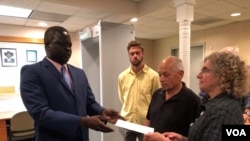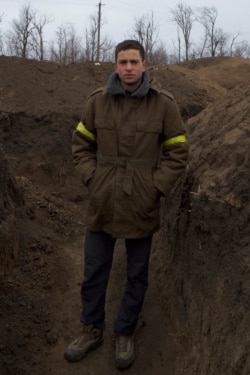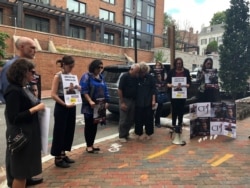The parents of Christopher Allen, a freelance journalist killed two years ago while covering fighting between government and rebel forces in South Sudan, met with the country's ambassador to the United States on Monday.
The meeting in South Sudan's Washington Embassy was the first time the family has spoken to any South Sudanese official, despite having written letters to President Salva Kiir and the former foreign minister.
John Allen and Joyce Krajian, the British-American journalist's parents, brought a letter to the embassy addressed to South Sudan's ambassador, Philip Jada Natana.
The Columbia Journalism Review reported Christopher Allen was killed the morning of Aug. 26, 2017, in Kaya, near Uganda's northwest border, while covering a rebel offensive. Circumstances surrounding his death are unclear.
Reporters Without Borders — known by its French acronym RSF — and partner rights groups have called for an independent investigation. They say Allen's death and the circumstances afterward could amount to war crimes.
Pictures of Allen's lifeless body flooded social media shortly after his death. The family accuses government officials of sharing some of those pictures, which they say humiliated their son and were "degrading and undignified," according to Dokhi Fassihian, executive director of RSF USA.
There is also credible evidence to suggest Allen was deliberately targeted as a journalist, another potential war crime, Fassihian said by email.
Daphne Pellegrino, RSF's North America advocacy manager, said South Sudan has not done enough to bring accountability and justice to Allen.
"Christopher Allen was killed with impunity, and this is absolutely unacceptable," she said at a vigil for Allen that was held Monday in Washington.
"We are very adamant that the South Sudanese government conduct a thorough investigation into this killing and is accountable for their actions both in the killing of Christopher Allen and in the aftermath," she added.
Embassy meeting
Allen's parents have made previous requests at the United Nations and the U.S. State Department for a thorough and independent investigation, but this was their first meeting with a South Sudanese official about their son's death.
Jada met with the family for about 10 minutes in the embassy lobby. While he offered condolences to Allen's parents, he distanced the government from any responsibility for his death.
"We tried as a government to investigate, but the fact remains that for a long time, we were not able to complete the investigation," he told them.
Allen entered South Sudan through its southern border without proper documents, Jada said. "He didn't come through the main town and through the main airport. Because then that becomes our responsibility once he enters," he said.
Calls to investigate
Adotei Akwei, Amnesty International's deputy director of advocacy and government relations, said he thinks the South Sudanese government "doesn't feel obligated" to investigate and is "determined to prevent any narratives that they don't like coming up."
"There is not going to be any change in this behavior," Akwei said. "So, they don't want any questions, and they are not going to investigate."
Courtney Radsch, CPJ's advocacy director, said her organization will not back down from demanding an independent investigation.
"Justice looks like an investigation, a meaningful investigation, into who was responsible and then how to prevent future killings like that," she said. "We know that there are journalists killed in crossfire. This was a very complicated case, and you certainly cannot achieve any form of justice if you don't have the basic facts about what happened. So, the first step toward any form of justice is an investigation."






